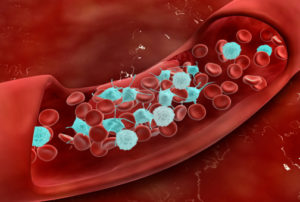A growing number of recent studies have observed an association between elevated hematocrit levels and thrombosis. However, the mechanism behind this pathway has remained elusive. A recent study induced an elevation of hematocrit levels in otherwise healthy mice to tease apart the etiology of the thrombosis formation under increased RBC levels. Compared with control mice, mice with elevated hematocrit had a shorter time to artery occlusion (13.2 vs 5.3 minutes, P<0.001) and reduced clotting time after tail transection. Elevated hematocrit levels increased the time that platelets are in close proximity to a thrombus, thereby increasing the probability that they will become activated and part of the clot. Whether venous thrombi form in a similar manner has yet to be determined, but this study highlights the importance of hematocrit levels on bleeding and thrombosis risk.
References:
Machlus KR, Battinelli EM. RBCs pin platelets against the (thrombus) wall. Blood 2017;129: 2460-1


Please citrate should not be used unless they are allergic to heparin there is also a lot of methods that are different that should be used which will promote a better outcome